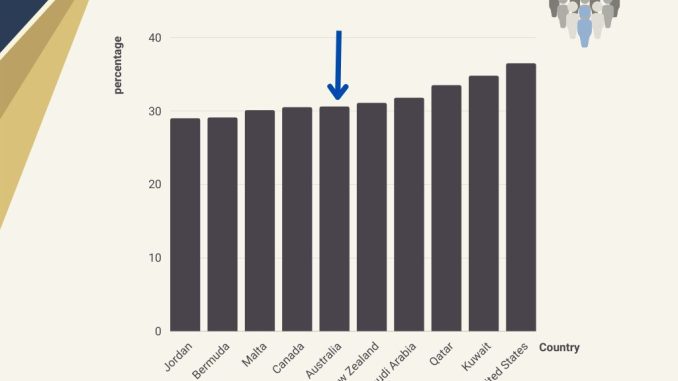
Australia is well known around the globe for its warm climate, sunny days, surfing and long beaches. What many people probably would call a perfect lifestyle? But what Australia also has to show off is one of the highest obesity levels in the world, far higher levels than countries like the UK, Spain and France.
Facts are showing that eating disorders among Australians are on a rapid surge the latest years. And over one million Australians are as of now experiencing some type of eating disorder, where the levels of eating disorders among children have nearly doubled from 2008 to 2018. What is this telling us and how come one of the most favourable and just crowned best city to live in has developed such a worrying evolution around health and obesity?
Percentage of obesity among its population*

In a recent article in the traditional Sydney Morning Herald journalist Amber Schultz wrote about the topic and argued how Social Media is the bad guy and causing people, especially women, to develop unhealthy body images and eating disorders. Butterfly.org, a national charity working with people impacted by eating disorders and body image issues, list sociocultural influences as one of the main reasons for developing an eating disorder, which can be reflected in magazines, tv or advertising.
As an international postgraduate student coming to Sydney for the second time, there are some things that I find are missing in the debate. Marcus with a background in Europe, but now lives in Sydney sparked my interest when he explained the Health Star Rating that is seen on groceries. And not only that, restaurants and cafés also display calorie intake on their menu, which they are legally required to do. What are these two enforced actions suppose to contribute to (except obviously make you feel bad about eating something with a low star rating and high-calorie intake?) And understanding that a salad is a better health choice than a chocolate bar would be quite easy to apprehend for most Australians.
“For me, Health is not a universal thing and it feels like these Health Star Ratings try to simplify something that is far more advanced. What suits me and my body might not suit all others. So I would not say that I have chosen groceries depending on their health star.”
Listen below to how Marcus elaborates more on his experience
Transcript of the audio
“For me, Health is not a universal thing and it feels like these Health Star Ratings try to simplify something that is far more advanced. What suits me and my body might not suit all others. So I would not say that I have chosen groceries depending on their health star.
My belief is that people nowadays are so educated that they understand what a good product is and what a bad product is when grocery shopping. The only time that I have really paid attention to the stars is when I have already bought something and then unpacks it or eat it at home.
“For example, on a Friday night when I crave chocolate and want to curl up on the sofa, the star labelling just stares at me with a 1 out of 5 rating and it just makes no sense other than fat-shaming me.”
The Obesity Evidence Hub also highlight some of the evaluation done after implementing the Health Star Rating and what could be seen is that the majority of the people influenced by the system did not choose a healthier product, it just confirmed that they should buy what they already would buy. In the report, it is also stated that companies try to manufacture groceries and products in order to get a higher star rating, meaning they tailor the ingredients to suit only what the factual labelling wants. And since the labelling is voluntary, manufacturers choose which products they want to label with a health star rating or not, meaning it is very easy to only showcase it on products that have high stars.
See below for another reported controversy regarding the health star rating.
And when we are dining out, don’t we want the satisfaction of not thinking about calories, weight and body standards? At least I know I want that. There is also research that supports both arguments in this area, one reason could be because it is still seen as a relatively new thing.
But reports from the US say that very little change is being made in orders at restaurants by consumers. In Australia is Obesity Evidence Hub saying that it can make a difference for obese people that want to make an informed decision and eat fewer calories. The overall take is that it brings small changes in consumer behaviour, while it on the opposite side can trigger a lot of people with eating disorders. Because counting calories is often found among people with eating disorders and those with an unhealthy body image ideal and therefore can calorie intake like this trigger people falling back into their eating disorder.
“Calorie intake and amount of calories is not an indicator of healthy or unhealthy, there are so many more layers to it. And especially out in restaurants where I want to try new food and get an experience without it being overshadowed by the guilt of ordering a dish with a lot of calories. It kinda ruins the mood.”
Maja, another international student in Sydney, gives her opinion on the matter. She also highlights her background of having friends with eating disorders and that they would strongly oppose this.

“I know from experience that counting calories is a problem among people with eating disorders and having it so clearly visible on menus can cause serious backlashes.”
Amber Shultz blames social media and influencers for causing unhealthy body image and eating disorders, but I would say the opposite. We see so much goodness from communities on social media and recently the Australian Influencer Taryn Brumfitt received an award for her work with body inclusivity.
It is more the old-fashioned weight loss and diet companies that have been educating us to chase calories and always eat less, starving us into shape fast and easily. Because models and celebrities with new slim looks being idolised by TV and Magazines have always been shaping our society. Diet and weight loss companies doing commercials aimed towards people (mostly women) to lose weight fast and look slim in the summer have also always been with us.
To conclude, influencers and social media have not brought this surge in eating disorders and unhealthy body images. It is several factors in our society that influence our behaviour, and ineffective tools such as Health Star Rating and listed calorie intake on menus is two of them. But I hope that we are at a paradigm shift. Legacy and controversial weight-loss company Jenny Craig have just gone into bankruptcy and this can further illustrate how the younger generation is ready for a new healthy body ideal, without labels and counting calories.







Be the first to comment